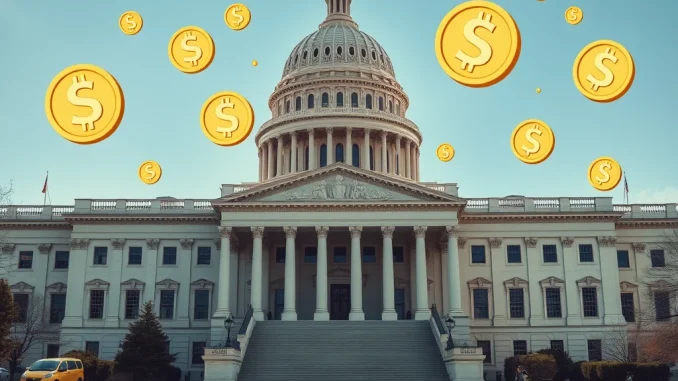
The future of stablecoins in the United States is currently navigating a critical legislative phase. As the US stablecoin bill progresses through the Senate, intense pressure is mounting, particularly concerning potential amendments that could distract from its core purpose: establishing clear stablecoin regulation. This development is capturing significant attention from policymakers, industry leaders, and anyone interested in the evolving landscape of digital assets.
Understanding the GENIUS Act and Senate Progress
At the heart of the discussion is the GENIUS Act, the proposed legislation aimed at creating a regulatory framework specifically for stablecoins. Stablecoins, designed to maintain a stable value relative to a reference asset like the U.S. dollar, are seen by many as a crucial bridge between traditional finance and the burgeoning crypto economy. Proponents argue that clear rules are essential for fostering innovation, protecting consumers, and ensuring financial stability.
The bill has now reached the final stage of floor discussion in the U.S. Senate. This phase is significant because it allows for potential modifications before a final vote. Senate Majority Leader John Thune has permitted the bill to be opened for amendments, a standard part of the legislative process but one that introduces complexity, especially for a focused piece of technology-specific legislation.
Why Amendments Pose a Challenge to Stablecoin Regulation
While amendments can sometimes improve legislation, they can also introduce unrelated measures that complicate or derail a bill’s original intent. In this instance, there’s an effort to attach the Credit Card Competition Act to the Senate stablecoin bill. This move, while potentially addressing different economic concerns, is seen by many in the crypto sector as an unwelcome addition that could burden the stablecoin bill with unrelated issues and slow down or jeopardize its passage.
Attaching unrelated provisions can lead to several challenges:
- **Dilution of Focus:** The primary goal of creating clear rules for stablecoins gets overshadowed by debates on other topics.
- **Increased Complexity:** Combining disparate pieces of legislation makes the overall bill harder to understand, negotiate, and pass.
- **Risk of Derailment:** Opposition to one part of the combined bill can sink the entire package, including the much-needed stablecoin framework.
The Industry’s United Call for Focused Crypto Regulation
In response to the potential for extraneous amendments, several prominent crypto advocacy organizations have issued a joint statement. Groups like the Blockchain Association, Crypto Council for Innovation, DeFi Education Fund, and the Digital Chamber are collectively urging the Senate to keep the GENIUS Act focused solely on its original purpose: establishing a sound framework for stablecoins.
Their message is clear: achieving effective crypto regulation requires a deliberate, focused approach. Stablecoins present unique regulatory challenges and opportunities that warrant dedicated legislative attention, free from unrelated riders.
The industry’s stance highlights a key tension in the legislative process: the balance between comprehensive lawmaking and the need for specific, targeted regulation in rapidly evolving sectors like digital assets. For stablecoins to thrive responsibly in the U.S., a clear, predictable regulatory environment is seen as paramount, and attaching unrelated provisions is viewed as counterproductive to this goal.
What This Means for the Future
The coming days will be crucial for the US stablecoin bill. The Senate’s decision on which amendments, if any, are allowed and ultimately included will significantly impact the bill’s final form and its chances of becoming law. The pressure from the crypto industry underscores the high stakes involved and the desire for policymakers to prioritize creating a functional regulatory path for stablecoins.
Keeping the bill focused on stablecoin regulation is, in the view of many, the most effective way to ensure that the U.S. can benefit from the potential of stablecoins while mitigating associated risks. The outcome of this legislative maneuvering will be a key indicator of how the U.S. approaches regulating specific aspects of the digital asset market going forward.
Conclusion: A Pivotal Moment for Stablecoins
The journey of the GENIUS Act through the Senate is a pivotal moment for crypto regulation in the United States. As the bill faces potential amendments, the united voice of the crypto industry serves as a powerful reminder of the need for focused, deliberate legislation. The call to keep the Senate stablecoin bill centered on its primary objective is not just about legislative tidiness; it’s about ensuring that the U.S. can build a clear, effective framework for stablecoins that fosters innovation and protects consumers without being weighed down by unrelated political battles. All eyes are now on the Senate as it navigates this crucial phase.



